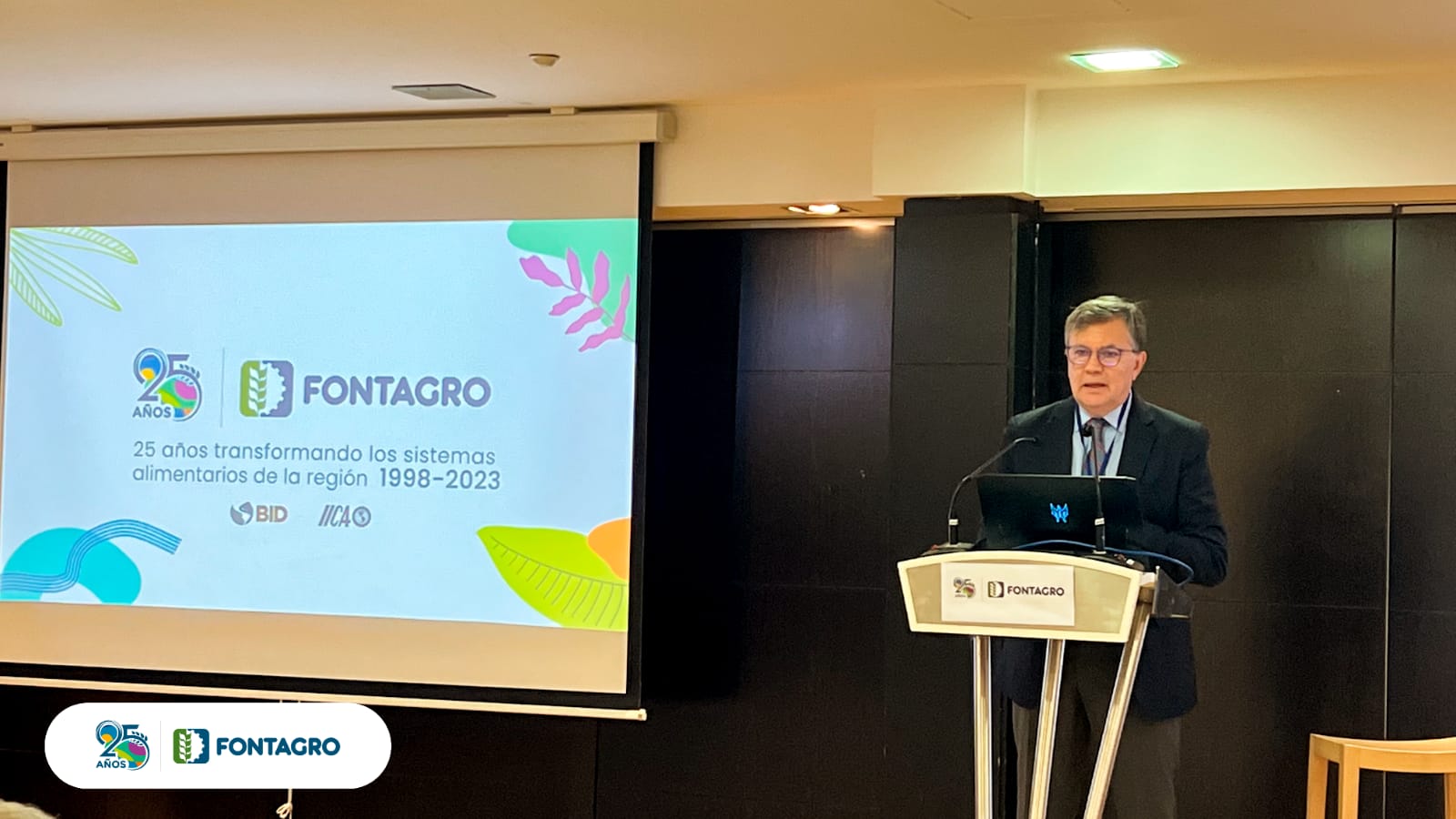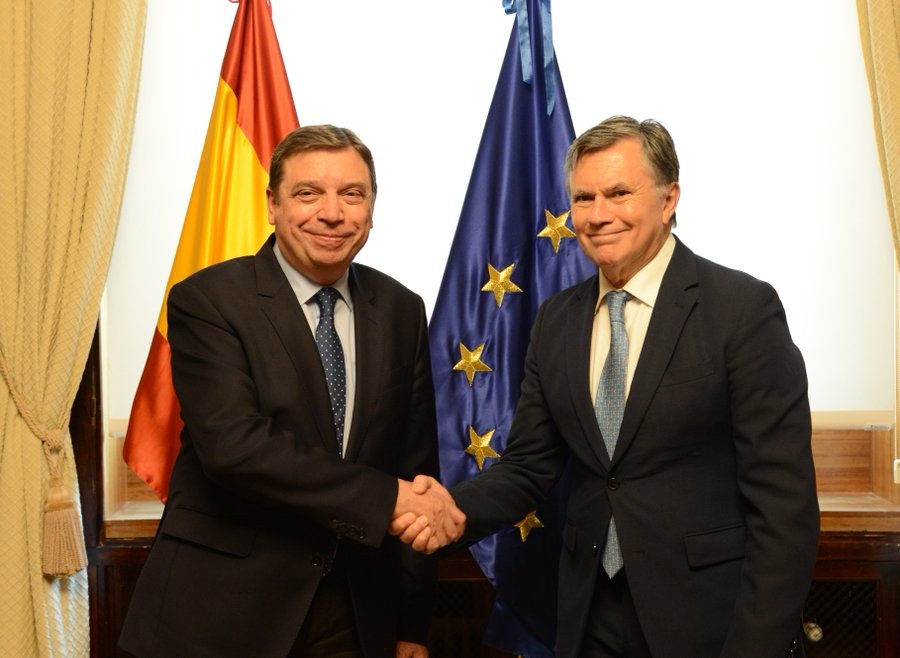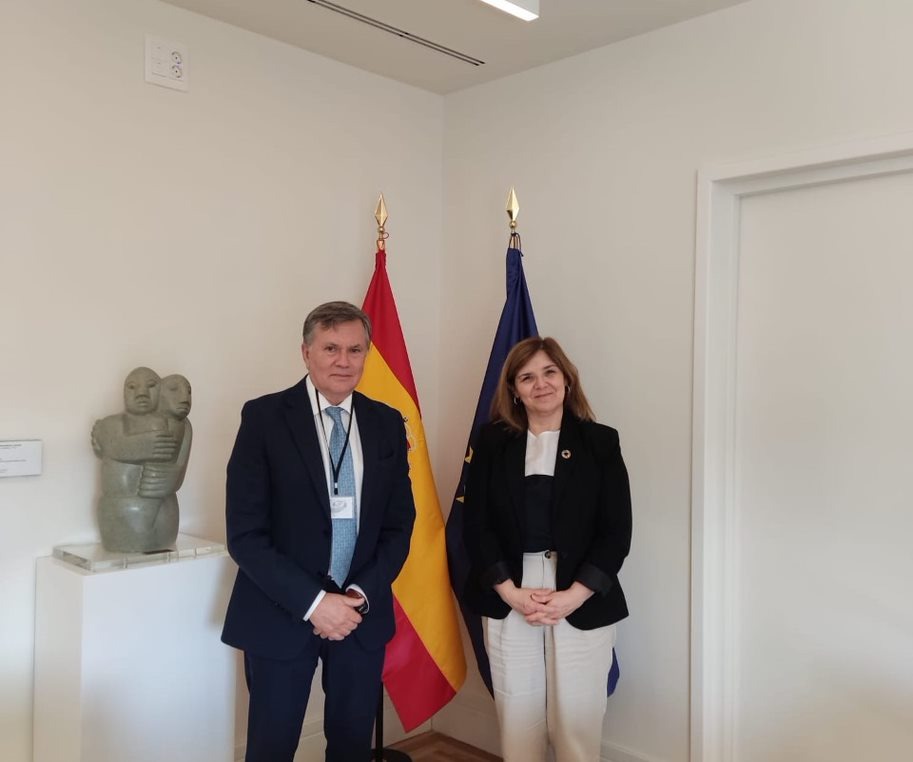During a visit to the Spanish capital, Otero also met with the Minister of Agriculture, Fisheries and Food (MAPA) of Spain, Luis Planas, as part of a series of high-level bilateral meetings in which he reaffirmed the key role of Latin America and the Caribbean for global food security and its commitment to transforming agrifood systems to foster a more productive, sustainable and inclusive agriculture sector together with farmers.

Madrid, 9 June 2023 (IICA) – In Madrid, the Director General of the Inter-American Institute for Cooperation on Agriculture (IICA), Manuel Otero, attended the 25th anniversary celebration of FONTAGRO, a cooperation mechanism with 15 member countries that fosters science, development and innovation in agriculture and food.
During a visit to the Spanish capital, Otero also met with the Minister of Agriculture, Fisheries and Food (MAPA) of Spain, Luis Planas, as part of a series of high-level bilateral meetings in which he reaffirmed the key role of Latin America and the Caribbean for global food security and its commitment to transforming agrifood systems to foster a more productive, sustainable and inclusive agriculture sector together with farmers.
“Today, we have more than enough reasons to be proud of having created a funding mechanism for agricultural innovation in member countries. The countries have taken ownership of this mechanism and FONTAGRO is sending out clear signals of what the priorities are in terms of science, technology and innovation”, said Otero at the FONTAGRO celebration.
The event, which brought together more than 25 researchers from 21 countries, showcased advances in projects related to livestock and dairy farming, soils, crops, AgTechs, irrigation, mitigation and innovation in family farming.
FONTAGRO’s Executive Secretary, Eugenia Saini, opened the event by explaining that “one of FONTAGRO’s most important objectives is to continue creating networks that add value and contribute to innovation”.

Arnulfo Gutiérrez, Director General of the Institute for Agricultural Innovation of Panama (IDIAP) and President of FONTAGRO, highlighted “the achievement of concrete results and very significant progress for the agriculture sector” by means of a major regional instrument focused on agricultural research.
Minister Planas and Otero commented on the strengthening of European Union-Latin American relations, reviewed the global agrifood agenda and discussed common areas of interest in which Spain and Ibero-America collaborate, such as agricultural insurance, water management in agriculture and associative undertakings.
Otero and Minister Planas also discussed the upcoming Conference of Ministers of Agriculture, which will bring together 34 ministers of Agriculture of the Americas in Costa Rica in October, and IICA’s work in preparation for COP28.
IICA’s Permanent Office for Europe has been operating for more than two decades at the headquarters of the Spanish Ministry of Agriculture, Fisheries and Food in Madrid, under an agreement that is expected to be renewed. Spain has associated country status at IICA.
Euroamérica Foundation
Otero also participated as a guest of honor in an event organized by the Euroamérica Foundation, a plural and independent organization that stimulates cooperation and understanding between European and Latin American institutions, companies and public figures with a view to fostering relations between Europe and the Americas.
Introduced by José Trigueros, President of Spain’s Institute of Engineering, and Carsten Moser, Vice-President of the Euroamérica Foundation, the Director General of IICA delivered a lecture entitled “Agriculture as an Engine for Economic Development, Food Security and Environmental Sustainability in Latin America”.
In his speech, Otero provided a comprehensive overview of the situation in Latin America and the Caribbean, emphasizing the strategic role of the region’s agriculture in overcoming economic, social and environmental challenges within the current global context.
“This necessary transformation of and the leading role of agriculture – and of agrifood systems – in Latin America and the Caribbean must be based on a new generation of public policies and institutional frameworks that are aligned with several basic principles”, among which he highlighted “sustainable intensification of production; climate resilience; reprioritization of rural territories; healthy diets and food safety; social inclusion with special emphasis on gender, youth and vulnerable groups; funding for the transformation of agrifood systems; regional and international trade; and science and innovation”.
The presentation was followed by a dialogue and question-and-answer session with the participation of various authorities, including Antón Leis, Director of the Spanish Agency for International Development Cooperation (AECID); Eduardo Ávila, Ambassador of Colombia in Spain; Marlon Brevé Reyes, Ambassador of Honduras; María Cruz Díaz Álvarez, President of the National Association of Agricultural Engineers (ANIA) and of the INGENIA Committee of the Institute of Engineering in Spain; Enrique Iglesias, former Ibero-American Secretary General; Orlando Leite Ribeiro, Ambassador of Brazil in Spain; Marcos Pinta Gama, Ibero-American Deputy Secretary; as well as representatives of other Latin American embassies, Spanish and European Union government agencies, multilateral entities and private companies.
“We face many common challenges and opportunities, and the new scenario requires collective action. That is why IICA is taking the lead in establishing a Hemispheric Partnership for Food Security and Sustainable Development in the Americas”, remarked Otero.

The Director General of IICA also met with the Spanish Secretary of State for International Cooperation, Pilar Cancela, with whom he exchanged views on common strategic issues. Key topics discussed included sustainable farming, rural development and food security. Otero also invited the Secretary to participate in the Forum of Ministers organized by the Institute.
Cancela, in turn, emphasized the policies of the Spanish government, which seek feminist cooperation, and noted that a gender perspective is applied in all of its projects. In that regard, she highlighted the Law on Cooperation for Sustainable Development and Global Solidarity and the joint work with AECID. She confirmed that Spanish cooperation will continue to prioritize agriculture in the work carried out in Latin America and the Caribbean.
More information:
Institutional Communication Division.
comunicacion.institucional@iica.int











